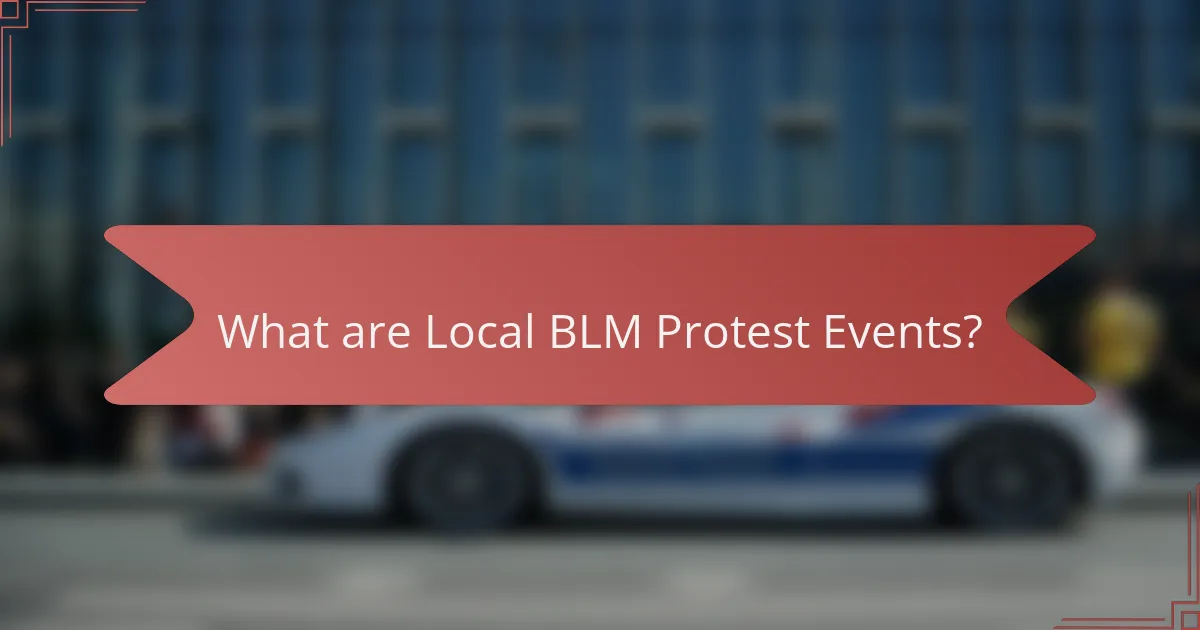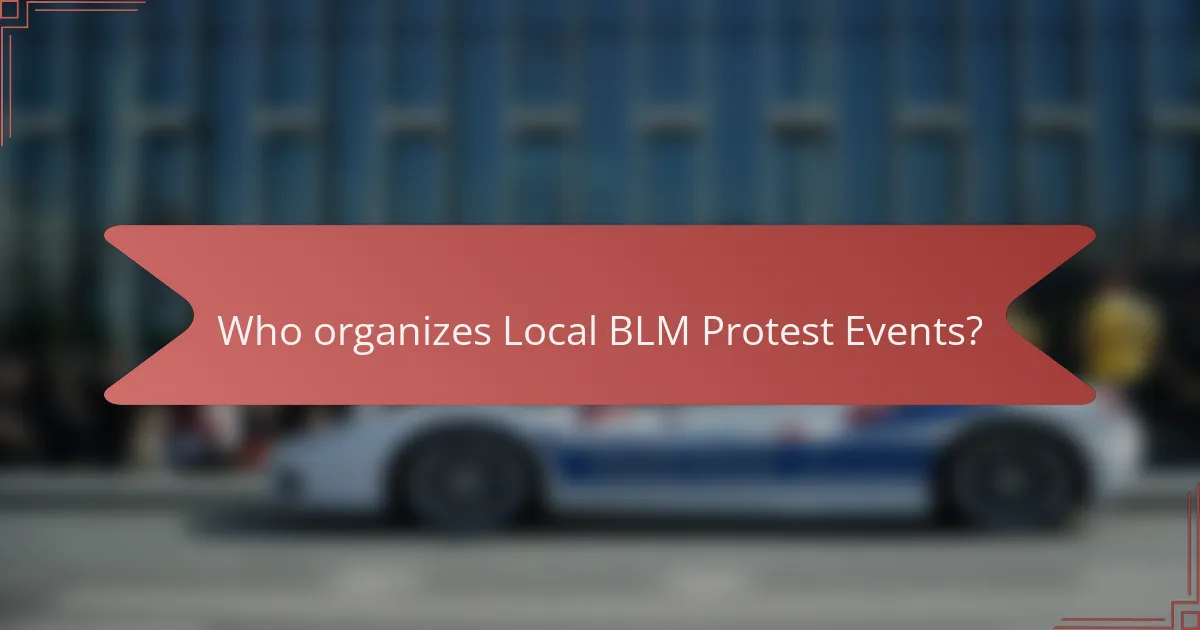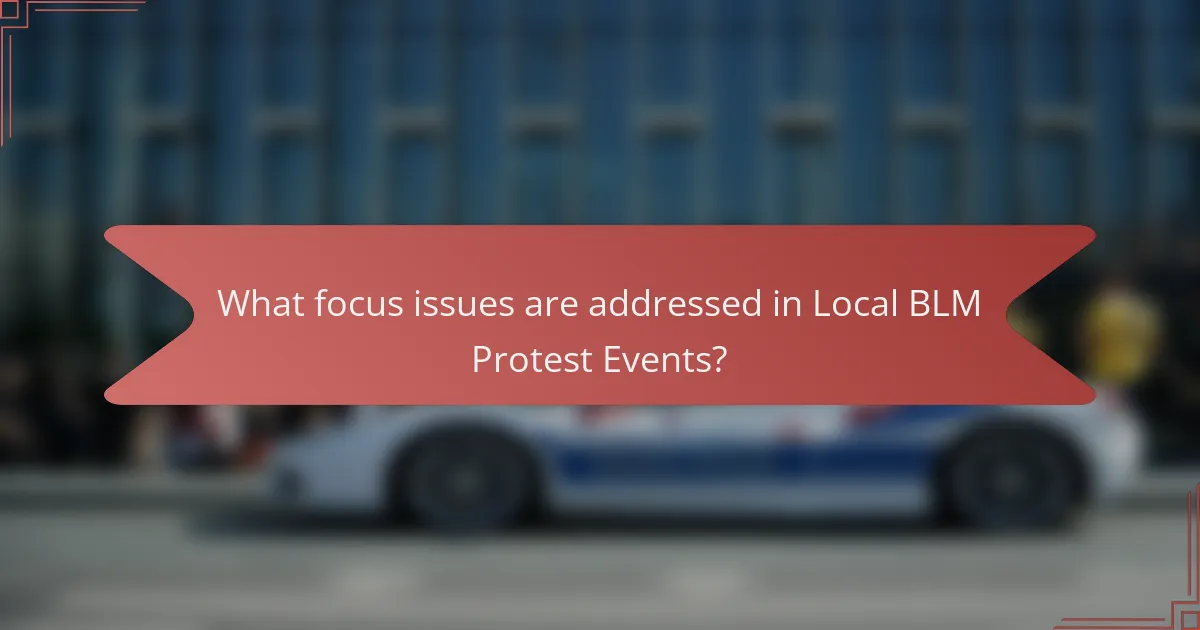
What are Local BLM Protest Events?
Local BLM protest events are organized gatherings advocating for racial justice and equality. These events typically occur in various cities, responding to local and national issues. They aim to raise awareness about systemic racism and police brutality. Participants often include community members, activists, and organizations. Events may feature speeches, marches, and educational sessions. Local organizers play a crucial role in planning and promoting these events. The protests are often scheduled in response to specific incidents or broader social movements. They contribute to the ongoing dialogue about civil rights and social justice in communities.
How do Local BLM Protest Events impact communities?
Local BLM protest events significantly impact communities by fostering awareness and dialogue around racial injustice. These events mobilize residents to engage in discussions about systemic inequalities. Increased visibility of social issues often leads to community solidarity and collective action. Local businesses may experience both economic boosts and disruptions during protests. Research from the American Economic Association indicates that protests can increase local civic engagement. Additionally, communities may see changes in local policies as a response to public demands. Overall, local BLM protests serve as catalysts for social change and community involvement.
What are the key objectives of these events?
The key objectives of local BLM protest events are to advocate for racial justice and police reform. These events aim to raise awareness about systemic racism and inequality. They provide a platform for marginalized voices to be heard. Additionally, these protests seek to mobilize community support for policy changes. They often focus on specific local issues, such as police violence or economic disparities. Engaging the public through peaceful demonstration is also a primary objective. Ultimately, these events strive to foster solidarity and community empowerment.
How do these events foster community engagement?
Local BLM protest events foster community engagement by bringing people together around shared social justice goals. These gatherings create a platform for discussion and collaboration among community members. They encourage active participation in civic issues, which strengthens community bonds. Events often include speakers, workshops, and activities that educate attendees about systemic racism and inequality. This education empowers individuals to take action within their own neighborhoods. Additionally, local protests often highlight specific issues affecting the community, increasing awareness and driving collective action. According to a study by the Pew Research Center, community involvement in protests can lead to increased political engagement and voter turnout. This demonstrates the lasting impact of such events on civic participation.
Why are specific dates important for Local BLM Protest Events?
Specific dates are important for Local BLM Protest Events because they often coincide with significant historical events or anniversaries. These dates can amplify the message and urgency of the protests. For example, protests may be organized on dates like Martin Luther King Jr. Day or the anniversary of George Floyd’s death. This timing helps to connect the current movement with historical struggles for racial justice. Furthermore, specific dates can mobilize larger crowds due to public awareness and media coverage. Events planned around these dates are likely to gain more visibility and support from the community. This strategic timing enhances the overall impact of the protests.
What factors influence the selection of protest dates?
The selection of protest dates is influenced by several key factors. These factors include historical significance, alignment with relevant events, and community availability. Historical dates, such as anniversaries of pivotal events, can enhance the protest’s impact. Aligning protests with national movements or local events can increase attendance and visibility. Additionally, organizers consider local calendars to avoid conflicts with other significant community activities. Weather conditions may also play a role in determining the most suitable dates for outdoor protests. Overall, these factors work together to maximize participation and effectiveness of the protest.
How do seasonal trends affect protest scheduling?
Seasonal trends significantly influence protest scheduling. Weather conditions play a crucial role in determining the timing of events. For instance, protests are often scheduled during milder seasons to ensure higher attendance. Research indicates that warmer months see increased participation due to favorable outdoor conditions. Additionally, holidays and local events can affect scheduling. Organizers may choose dates that align with significant anniversaries or social movements. This strategic timing can enhance visibility and impact. Historical data shows that protests held in spring and summer months typically attract larger crowds compared to those in winter.

Who organizes Local BLM Protest Events?
Local BLM protest events are organized by grassroots activists, community organizations, and local chapters of the Black Lives Matter movement. These groups often collaborate with other social justice organizations to plan and execute events. The organizers typically include individuals passionate about racial equality and justice. They mobilize community members through social media and local networks. Each event may have specific leaders or coordinators responsible for logistics and outreach. Local BLM chapters provide structure and support for these initiatives. Many events are also supported by coalitions that advocate for broader social issues. This collaboration enhances the impact and reach of the protests.
What roles do local activists play in organizing these events?
Local activists play crucial roles in organizing BLM protest events. They mobilize community members to participate and raise awareness. Activists often coordinate logistics such as location, permits, and security. They also develop the event’s agenda and messaging to ensure alignment with local issues. Activists work to engage speakers and performers to enhance the event’s impact. They utilize social media and local networks to promote participation and share updates. Many activists also provide training on peaceful protest techniques and safety measures. Their grassroots connections help foster a sense of community and solidarity among participants.
How do grassroots organizations contribute to the planning process?
Grassroots organizations contribute to the planning process by mobilizing community members and raising awareness. They facilitate dialogue between residents and local authorities. These organizations often identify key issues affecting their communities. They gather input from diverse groups to ensure inclusive planning. Grassroots efforts can lead to more representative decision-making. Historical examples show that grassroots movements have influenced policy changes. For instance, the Civil Rights Movement relied heavily on grassroots organizing for effective planning and execution. This demonstrates their critical role in shaping community initiatives.
What partnerships are typically formed for event organization?
Partnerships typically formed for event organization include collaborations with local government agencies, non-profit organizations, and community groups. Local government agencies often provide permits and logistical support. Non-profit organizations may contribute resources and expertise related to specific causes. Community groups help mobilize volunteers and participants. Additionally, partnerships with local businesses can offer sponsorships and venues. Media partnerships are also common for promoting events. These collaborations enhance the event’s reach and effectiveness.
How can community members get involved with event organizers?
Community members can get involved with event organizers by participating in planning meetings. These meetings often outline event details and gather input from attendees. Additionally, volunteers can assist with logistics, such as setting up venues or distributing materials. Social media platforms provide a way for individuals to connect with organizers and share event information. Community members can also attend events to show support and engage with organizers directly. Research indicates that active participation fosters stronger community ties and enhances event success.
What are the best practices for collaboration with organizers?
Establishing clear communication is essential for effective collaboration with organizers. Regular updates and feedback help maintain alignment on goals. Setting mutual expectations ensures all parties understand their roles. Building trust through transparency fosters a supportive environment. Engaging in active listening allows for better understanding of each other’s perspectives. Sharing resources can enhance the overall effectiveness of the collaboration. Documenting agreements and decisions prevents misunderstandings later on. Finally, celebrating successes together strengthens the partnership and encourages future collaboration.
How can individuals support organizers in their efforts?
Individuals can support organizers by volunteering their time and skills. They can help with logistics, such as setting up event spaces or managing supplies. Financial contributions also provide essential resources for organizing events. Sharing information through social media amplifies the reach of organizers’ messages. Attending events shows solidarity and encourages community participation. Engaging in local discussions raises awareness about the issues at hand. Additionally, individuals can connect organizers with local businesses for sponsorship opportunities. Each of these actions strengthens the efforts of organizers in advocating for social justice.

What focus issues are addressed in Local BLM Protest Events?
Local BLM protest events address issues of racial injustice, police brutality, and systemic inequality. These protests emphasize the need for accountability in law enforcement practices. They also advocate for policy changes aimed at dismantling systemic racism. Economic disparities and access to resources are often highlighted as critical concerns. Environmental justice and its intersection with racial issues may also be discussed. The events aim to raise awareness and mobilize communities for social change. Additionally, they focus on amplifying marginalized voices and fostering solidarity among diverse groups. These issues are rooted in historical contexts of oppression and continue to affect communities today.
How do focus issues vary by city?
Focus issues vary by city based on local social, economic, and political contexts. For instance, cities with higher rates of police violence may emphasize police reform. Cities facing economic disparities might focus on economic justice and equity. Community demographics also influence focus issues. Areas with significant minority populations may prioritize racial inequality. In contrast, cities with diverse populations may address intersectional issues. Historical events in each city shape current focus areas. For example, cities with a history of civil rights movements often emphasize systemic racism. Local leadership and activist groups also play a significant role in defining focus issues. Each city’s unique challenges result in distinct protest themes and priorities.
What are common themes in focus issues across different cities?
Common themes in focus issues across different cities include police brutality, systemic racism, and social justice reform. These themes are prevalent in protests organized under the Black Lives Matter movement. Police brutality cases often serve as a catalyst for protests in various locations. Systemic racism is a critical issue that protesters highlight, emphasizing the need for comprehensive policy changes. Social justice reform encompasses demands for equitable treatment and systemic changes in law enforcement practices. Research indicates that these themes resonate widely, as seen in multiple cities during recent protests. Various cities have reported similar grievances, reinforcing the national dialogue on these critical issues.
How do local demographics influence the focus issues?
Local demographics significantly influence the focus issues of protest events. The racial composition of a community shapes the concerns addressed during protests. For example, predominantly Black neighborhoods may prioritize police violence and systemic racism. Conversely, areas with diverse populations might emphasize broader social justice issues. Economic factors also play a role; communities facing high unemployment may focus on economic inequality. Additionally, local history and past incidents of racial injustice can dictate specific grievances. Research shows that demographic trends directly correlate with protest themes and mobilization strategies. These trends highlight the unique context in which local protests occur.
Why is it essential to understand the focus issues of Local BLM Protest Events?
Understanding the focus issues of Local BLM Protest Events is essential for effective advocacy and community engagement. These focus issues highlight specific local injustices and systemic problems. Recognizing these issues allows organizers to tailor their messages to resonate with community needs. It also fosters solidarity among participants, creating a united front for change. Additionally, understanding these issues aids in mobilizing resources and support from allies. For instance, local focus issues may include police accountability or housing inequality. Addressing these concerns can lead to more impactful and relevant protests. Ultimately, informed engagement enhances the likelihood of achieving meaningful reforms.
How do focus issues shape the narrative of the protests?
Focus issues significantly shape the narrative of protests. They determine the specific grievances and demands that protesters emphasize. For example, in Black Lives Matter (BLM) protests, focus issues often include police brutality, systemic racism, and social justice. These issues guide the messaging and strategies used during demonstrations. Media coverage also reflects these focus issues, influencing public perception. In cities like Minneapolis, the focus on George Floyd’s death galvanized widespread protests. Similarly, focus issues can mobilize community support and attract diverse participants. Ultimately, the narrative of protests evolves based on which issues are prioritized by organizers and participants.
What impact do focus issues have on public perception?
Focus issues significantly shape public perception during protests. These issues determine the narrative and priorities of the movement. For instance, a focus on police brutality may garner wider support than less relatable topics. Public perception can shift positively if focus issues resonate with community values. Conversely, if focus issues appear divisive, they may alienate potential supporters. Research shows that clear, relatable focus issues lead to increased engagement. Events highlighting specific injustices often attract media attention and public sympathy. In summary, focus issues directly influence how the public views and supports protest movements.
What practical tips can attendees follow for Local BLM Protest Events?
Attendees of local BLM protest events should prioritize safety and preparedness. Wear comfortable clothing and sturdy shoes for long durations. Bring water and snacks to stay hydrated and energized. Carry a phone for communication and emergency contacts. Familiarize yourself with the protest route and meeting points. Respect local laws and follow the guidance of event organizers. Stay aware of your surroundings and avoid confrontations. If possible, attend with friends for mutual support and safety.
Local BLM protest events are organized gatherings that advocate for racial justice and equality, responding to both local and national issues. The article outlines the impact of these events on communities, emphasizing awareness, dialogue, and policy change, while also detailing the roles of local activists and grassroots organizations in the planning process. It highlights the importance of specific dates and seasonal trends in protest scheduling, the focus issues addressed, and how local demographics shape these concerns. Furthermore, practical tips for attendees are provided to enhance safety and preparedness during participation in these events.